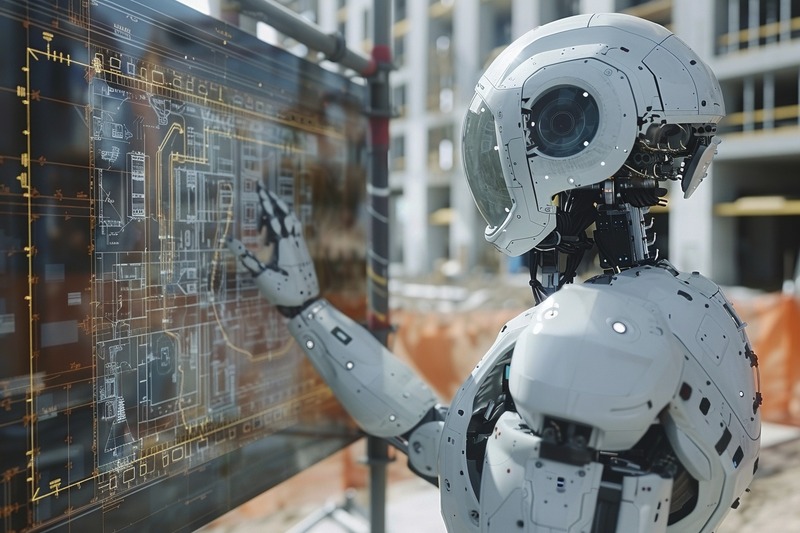Artificial Intelligence (AI) is transforming the rules of the game across most industries.
Facility management is no exception to this transformation. This technology offers facility managers new opportunities in various areas, from increasing operational efficiency to reducing energy consumption.
So, what exactly is artificial intelligence changing in facility management, and how will these changes impact work environments?
Smart Maintenance and Repair

Artificial Intelligence (AI) is bringing groundbreaking innovations and transformations to the maintenance processes of equipment and infrastructure in facilities.
According to a report highlighted by FMJ, AI-powered technologies not only enhance fault detection and maintenance management but also increase operational efficiency by reducing energy consumption and cutting costs significantly.
The report also emphasizes that these technologies offer a significant strategic advantage in the field of facility management. For businesses aiming to gain a competitive edge in the future, investing in AI-driven solutions is seen as a critical opportunity rather than a mere option.
Energy Efficiency and Sustainability
Energy consumption remains one of the highest cost items in facility management. As energy prices continue to rise, solutions focused on improving energy efficiency have become a strategic priority for many businesses.
AI-powered systems are offering revolutionary opportunities in this field.
Smart energy management systems can monitor and analyze energy usage across an entire facility in real time, identifying where and when unnecessary consumption occurs. As a result, energy use can be optimized to ensure that resources are only consumed when and where they are actually needed.
For example, AI algorithms analyze factors such as human occupancy levels, external weather conditions, and usage patterns to automatically adjust heating, cooling, and lighting systems. This not only prevents energy waste but also improves occupant comfort.
Ultimately, this leads to a significant reduction in energy costs while contributing to organizations’ environmental sustainability goals.
According to FMJ’s report, in today’s world of escalating energy costs, businesses are increasingly turning to next-generation technologies to achieve greater energy efficiency and fulfill their sustainability commitments.
AI plays a critical role in energy management by increasing predictability and enabling the implementation of more effective strategies.
Smart Space Management
Artificial Intelligence (AI) offers significant solutions not only in energy efficiency and maintenance processes but also in optimizing the use of workspaces. In large facilities and office environments in particular, understanding how frequently and intensively different areas are used is crucial for effective space management.
With the help of sensors and AI-based analytics systems, movement and usage data from offices and common areas are collected and analyzed in real time. This data provides clear insights into which areas are highly utilized and which remain underused or vacant.
As a result, workspace layouts can be redesigned, and underutilized areas can be repurposed for different functions. By reducing unnecessary space usage, businesses can achieve significant savings in both energy consumption and maintenance costs, while also creating more functional, flexible, and productivity-enhancing work environments.
Additionally, AI-powered systems help optimize office planning and resource allocation processes, enabling businesses to exercise greater control over real estate and operational expenses.
For more information and to manage visitor flow and space utilization more effectively, take a look at our Visitor Management System module. With this system, you can analyze entry-exit data and reach a new level of efficiency in space management.
Security and Risk Management
Security is a critical aspect of facility management, and artificial intelligence offers effective solutions in this area as well. AI-powered surveillance cameras can automatically detect unusual behaviors within a building and instantly send alerts to security personnel.
This enables faster responses to potential threats and helps prevent security incidents before they escalate. For more information, you can explore our Task Management module.
The Future of Facility Management with Artificial Intelligence
The use of artificial intelligence in facility management not only addresses today’s operational challenges but also holds the potential to create smarter facilities for the future. As highlighted by FMJ, AI integration is seen as a key tool for achieving not just operational efficiency but also broader environmental sustainability goals.
For facility managers, integrating AI-based systems is becoming an essential investment to achieve more efficient and sustainable operations.
Companies that adopt this technology early stand to gain a wide range of benefits, including cost advantages, improved operational efficiency, and safer working environments. To learn more about how you can leverage these advancements, take a look at our Cargo Management module.
Conclusion
In conclusion, artificial intelligence has the potential to drive revolutionary changes in facility management.
These transformations present significant opportunities to increase efficiency and reduce costs. From energy optimization and smart maintenance to enhanced security and space management, AI’s impact is set to expand across all areas of facility management.
As FMJ points out, for facility managers to fully capitalize on this transformation, it is crucial to adopt AI-powered solutions and integrate them effectively into their operations. To discover more about the latest developments and practical applications, explore Girin’s Mobile Time Attendance (PDKS) and Visitor Management Systems, and take the first step toward smarter, more efficient facility management.



